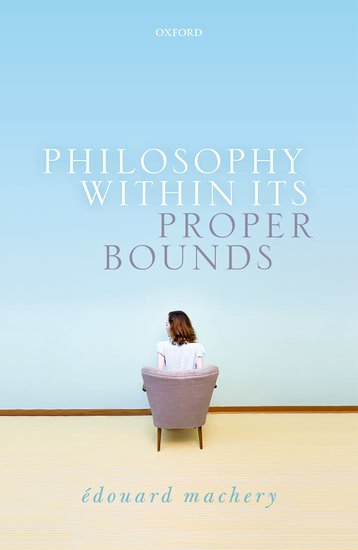In the previous post I presented the main arguments against the method of cases developed in Philosophy Within Its Proper Bounds. Various objections can be raised against this argument, some of which have already been put in print. Chapter 5 addresses 8 objections: I defend the experimental quality of the research done by experimental philosophers, provide evidence that reflective judgments do not differ from the judgments reported by experimental philosophers, show that philosophers are not expert judgers, explain why their findings generalize beyond the cases that have been examined, argue that the lesson to be drawn from experimental philosophy can’t just be that judgments are fallible, explain why the prospects for a reform of the method of cases are dim, make the point that Unreliability, Dogmatism, and Parochialism do not rest on a mischaracterization of the use of cases in philosophy, and defuse the threat that if sound these three arguments would justify an unacceptable general skepticism about judgment.
Of particular interest are the first three objections. Recent work suggests that experimental philosophers’ experimental papers are less likely to suffer from the biases that influence psychology. Cova et al. (in press) have shown that experimental philosophers’ results are more likely to replicate than psychologists’; Colombo et al. (2018) that they include fewer statistical mistakes; Stuart, Colaço, and Machery (ms) that they don’t show much evidence of p-hacking. Furthermore, experimental philosophers have gone out of their way to address experimental concerns from skeptical philosophers.
The notion of reflection used to criticize the metaphilosophical significance of experimental philosophers’ findings can be understood in many different ways (Colaço, Kneer, Alexander, and Machery, ms), but on at least one understanding recent experimental evidence suggests that priming reflection at best rarely influences the judgments lay people make in response of cases. Thus, one cannot dismiss experimental findings about the judgments elicited by philosophical cases by arguing that these judgments are shots from the hip, which are irrelevant to genuine philosophizing, as proponents of the reflection defense do.
The expertise defense, according to which philosophers are experts are judging about the situations described by philosophical cases, has been widely discussed in recent years, and Chapter 5 of Philosophy Within Its Proper Bounds contributes to the discussion. I view the so-called scientific analogy as an unsuccessful attempt to support the expertise defense, and I argue that the two best models of what philosophers’ expertise looks like are not convincing. More important, a small but growing body of evidence suggests that philosophers suffer from the same plights as lay people.
Where does this discussion leave us? Chapter 6 brings back the discussion to the question of whether we can know the metaphysical necessities and possibilities needed to resolve modally immodest philosophical issues. I am no modal skeptic: We can know many modal claims (e.g., many counterfactual claims), but the arguments developed in Philosophy Within Its Proper Bounds supports a restricted form of modal skepticism: If there is no alternative to the method of cases to come to know them, many metaphysical necessities and possibilities are beyond our epistemic reach. We will never know whether physicalism is true, whether knowledge entails safety, whether causation reduces to some form of counterfactual dependence, etc. Most of these issues should be set aside, I conclude.
But isn’t there any alternative to the method of cases to learn the relevant metaphysical necessities and possibilities? It would be a mistake to appeal to a faculty of intuition: Faculties should be hypothesized when they are explanatory necessary and when they fit our best psychology. Intuition fails on both counts.
More plausible, one may think that we can learn metaphysical necessities and possibilities by analyzing the meaning of the relevant words (“causation,” “identity,” “permanence,” etc.). This proposal seems to require a distinction between semantically or epistemically analytic and synthetic propositions, and I have expressed doubts about these distinctions in Chapter 1. I also appeal to Waismann’s open texture of concepts to undermine the proposal. The meaning of words leaves it indeterminate whether a concept applies in many strange, but possible situations. This undermines the proposal that we could establish that something (e.g., a pattern of counterfactual dependence) is metaphysically sufficient for something else (e.g, a causal relation) to be the case by analyzing the meaning of words because in some possible situations it will just be indeterminate whether the relevant concept (e.g., causation) genuinely applies. Waismann’s argument is then extended to necessity claims.
Finally, and most interesting perhaps, I argue that we cannot use theoretical virtues to choose between competing philosophical views. A common justification for their use is that they are used in scientific choice among theories and that philosophy is continuous with science. Theoretical virtues are however rarely used in science: what matters most often is fit, the relation between data and hypotheses. When they are used, it is in epistemically unusual situations. The proposal to use theoretical virtues to choose among competing philosophical views is thus very different from their actual use in science and cannot be justified by appealing to the latter. Furthermore, when it comes to choosing theories in science theoretical virtues are always locally justified: Simplicity, e.g., is justified to avoid the overfitting of statistical models. But these local justifications do not justify the general use of theoretical virtues in theory choice in science and a fortiori in philosophy.
I conclude that there are no alternatives to the method of cases. Since the method of cases is deficient, we are left with an unsettling restricted form of modal skepticism: Many of those metaphysical necessities and possibilities that matter most in philosophy are beyond our epistemic reach and we must set aside venerable, but unresolvable philosophical issues.

